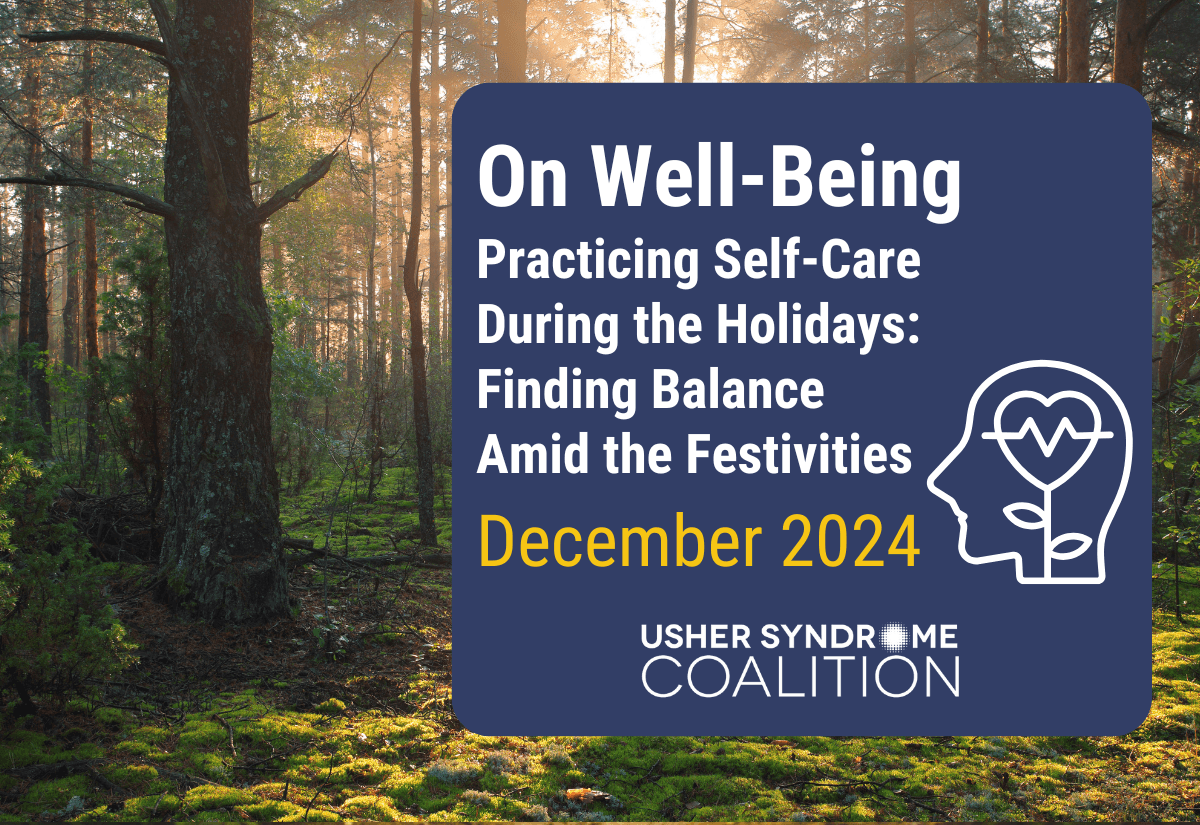
The holiday season is a time of joy and togetherness, but it can also bring stress and overwhelm. It’s easy to put yourself last in the hustle of shopping, planning, and attending events. That’s where self-care comes in. Taking time to care for yourself isn’t selfish—it’s essential, especially when managing the unique challenges of living with Usher syndrome.
What Is Self-Care?
Self-care involves taking deliberate actions to care for your physical, emotional, and mental health. It’s not about overhauling your routine or adding another item to your to-do list. Instead, it’s about weaving small, meaningful practices into your day to recharge your mind and body. Studies show that people who practice regular self-care report lower levels of anxiety and higher satisfaction with life (Perrin et al., 2017).
The Science of Self-Care and Stress Relief
Consider adopting the Danish concept of hygge (pronounced hoo-gah), which emphasizes coziness, comfort, and connection. Think warm blankets, soft lighting, and enjoying simple pleasures with loved ones. One study by Pressman et al. (2009) found that engaging in relaxing activities can lower cortisol levels—the stress hormone—and improve immune function. Whether it’s taking a quiet walk, enjoying a cup of tea, or setting aside time for a favorite hobby, these small practices can have significant effects on mental health.
Incorporating hygge into your life can help slow things down and bring a little calm to the chaos. Research suggests that cultivating cozy, comforting environments can boost happiness and resilience—perfect for the holiday season.
Tips for Holiday Self-Care
Here are some practical ways to nurture yourself this season:
- Create a peaceful space: Dedicate a corner of your home to relaxation—add soft textures, warm lighting, and calming scents.
- Practice mindful breathing: Spend a few minutes each day focusing on your breath to reduce stress and improve focus.
- Set boundaries: Say no to events or activities that feel overwhelming, and give yourself permission to rest.
- Prioritize sleep: Quality rest is crucial for recharging your body and mind. Consider creating a bedtime ritual to wind down.
- Connect with others: Lean on your support system and share meaningful moments with loved ones.
- Self-Care and Resilience in the Usher Syndrome Community
Practicing self-care is a powerful tool for building resilience. By addressing your own needs, you can better manage the challenges of the condition while staying grounded and hopeful. Whether it's joining a support group, carving out time for a personal hobby, or embracing hygge, self-care can provide a sense of control and peace.
As we navigate the holiday season, remember that taking care of yourself is not only beneficial for you—it also allows you to show up fully for those you care about.
You are not alone.
References
- Perrin, P. B., et al. (2017). "The impact of self-care practices on stress and resilience." Journal of Health Psychology, 22(9), 1146-1155.
- Pressman, S. D., et al. (2009). "Relaxation and its impact on cortisol and immune function." Journal of Psychosomatic Research, 67(6), 573-581.







